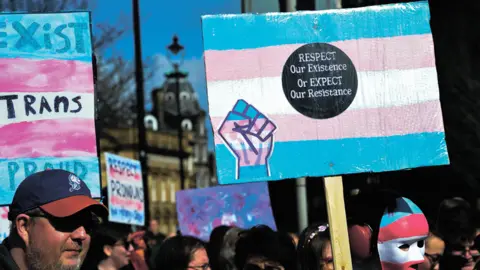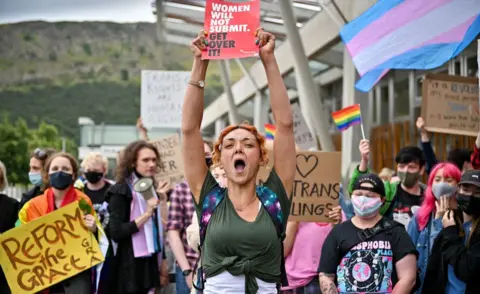Call for rethink of Scottish gender recognition reforms
 Getty Images
Getty ImagesA major UK human rights body has urged the Scottish government to pause its reforms to the gender recognition process for further consideration.
Ministers want to change the system to make it easier for people to change their legally recognised gender, and a bill is expected at Holyrood this year.
But the Equality and Human Rights Commission has told them that "more detailed consideration is needed".
The government has already conducted two consultations on the plans.
A spokesperson said it would continue "to seek consensus where possible, and to work to support respectful debate".
Prominent LGBT group the Equality Network accused the EHRC of being "UK government appointees" who were "failing to stand up for equality for trans people".
The EHRC is funded by the Government Equalities Office, but insists that it operates independently of ministerial control as a regulator of equality and human rights law.
The government wants to streamline the current process for obtaining a gender recognition certificate, which it says can be "traumatic and demeaning".
Proposed changes would mean applicants would no longer have to go before the UK Gender Recognition Panel - instead applying to the Registrar General for Scotland - or produce a medical diagnosis of gender dysphoria.
They would have to make a solemn statutory declaration that they have been living in their acquired gender for three months - down from two years - and intend to do so permanently.
A further three-month "reflection period" would mean the process would take a minimum of six months.
There has been controversy over the proposals, with campaigners and politicians including some government ministers questioning how they could affect women-only services.
And the EHRC has written to Social Justice Secretary Shona Robison to say that "more detailed consideration is needed before any change is made".
 Getty Images
Getty ImagesChairwoman Baroness Kishwer Falkner highlighted concerns cited ranging from "those relating to the collection and use of data, participation and drug testing in competitive sport, measures to address barriers facing women and practices within the criminal justice system".
She said there needed to be "urgent improvements to gender identity services throughout Britain", but further consideration was needed before any change to the law was made.
Baroness Falkner added: "The established legal concept of sex, together with the existing protections from gender reassignment discrimination for trans people and the ability for them to obtain legal recognition of their gender, collectively provide the correct balanced legal framework that protects everyone."
The Equality Network issued a furious response to the letter, with director Tim Hopkins claiming that the EHRC board was "directly appointed" by the UK government and was "failing to stand up for equality for trans people".
He added: "We do not need UK government appointees telling us in Scotland how to legislate in devolved areas, and we look forward to the Scottish government proceeding with this legislation soon."
The Scottish Greens - which form part of the Scottish government with the SNP - said the EHRC intervention was "deeply disappointing".
'Stigmatised minority'
The Scottish government has held two consultations on its plans. The first, in 2018, attracted 15,697 responses, while the second spanned 2019 and 2020 and received 17,058 submissions.
A major theme of the second consultation was consensus that "the debate has become highly polarised" and toxic, and was underpinned by "a social media culture in which people are being bullied and harassed by those taking a different view".
A Scottish government spokesperson said: "Our proposals to reform the current Gender Recognition Act do not introduce any new rights for trans people or change single sex exceptions in the Equality Act.
"Our support for trans rights does not conflict with our continued strong commitment to advance equality and to protect and uphold women's rights."
First Minister Nicola Sturgeon pledged to bring forward legislation in the first year of the current parliamentary term.
She said she understood that "some have sincerely held concerns" about the plans, but said it would "make the existing process of gender recognition less degrading, intrusive and traumatic".
She added: "In other words, it will make life that bit easier for one of the most stigmatised minorities in our society. What it will not do is remove any of the legal protections that women currently have."
